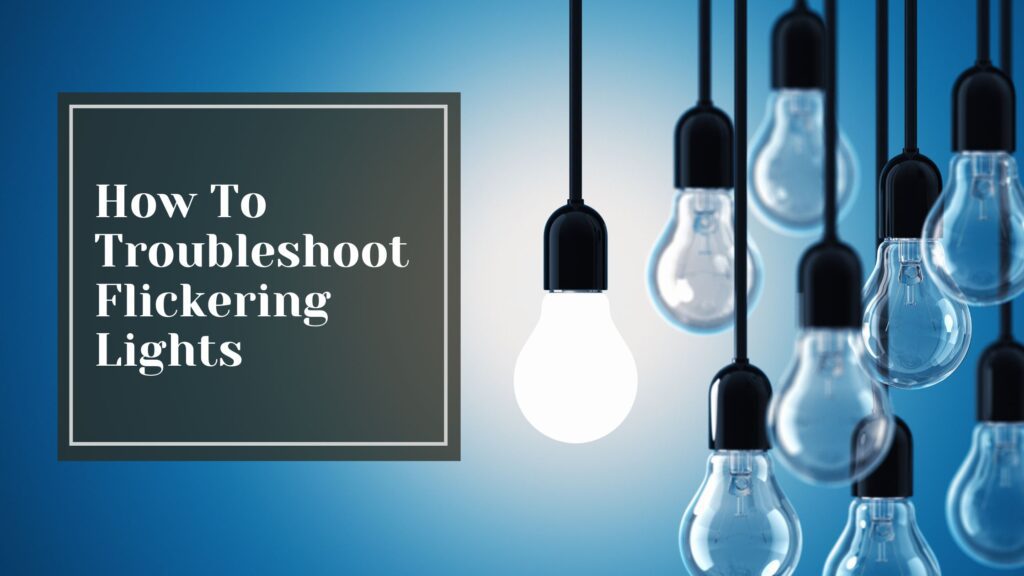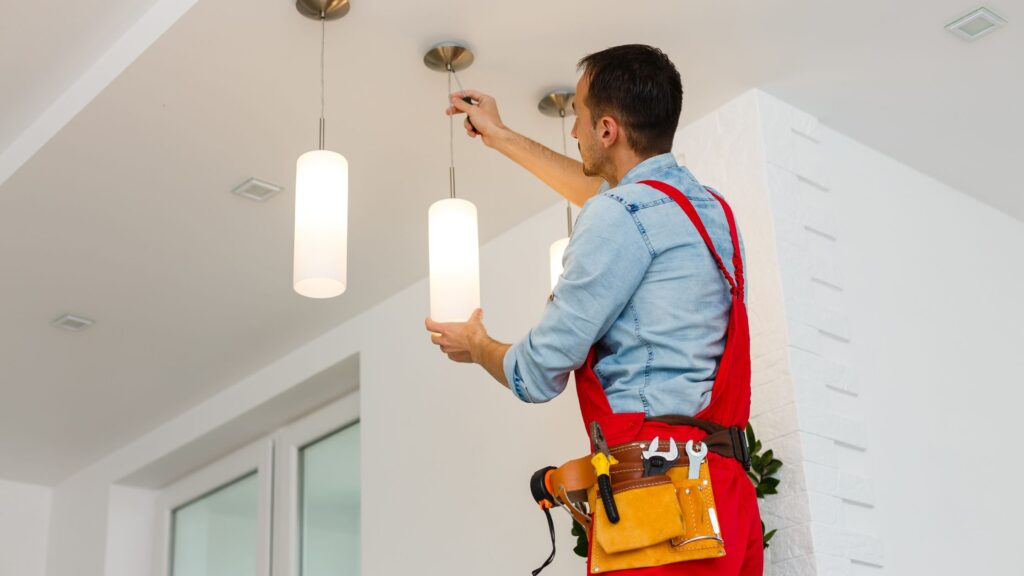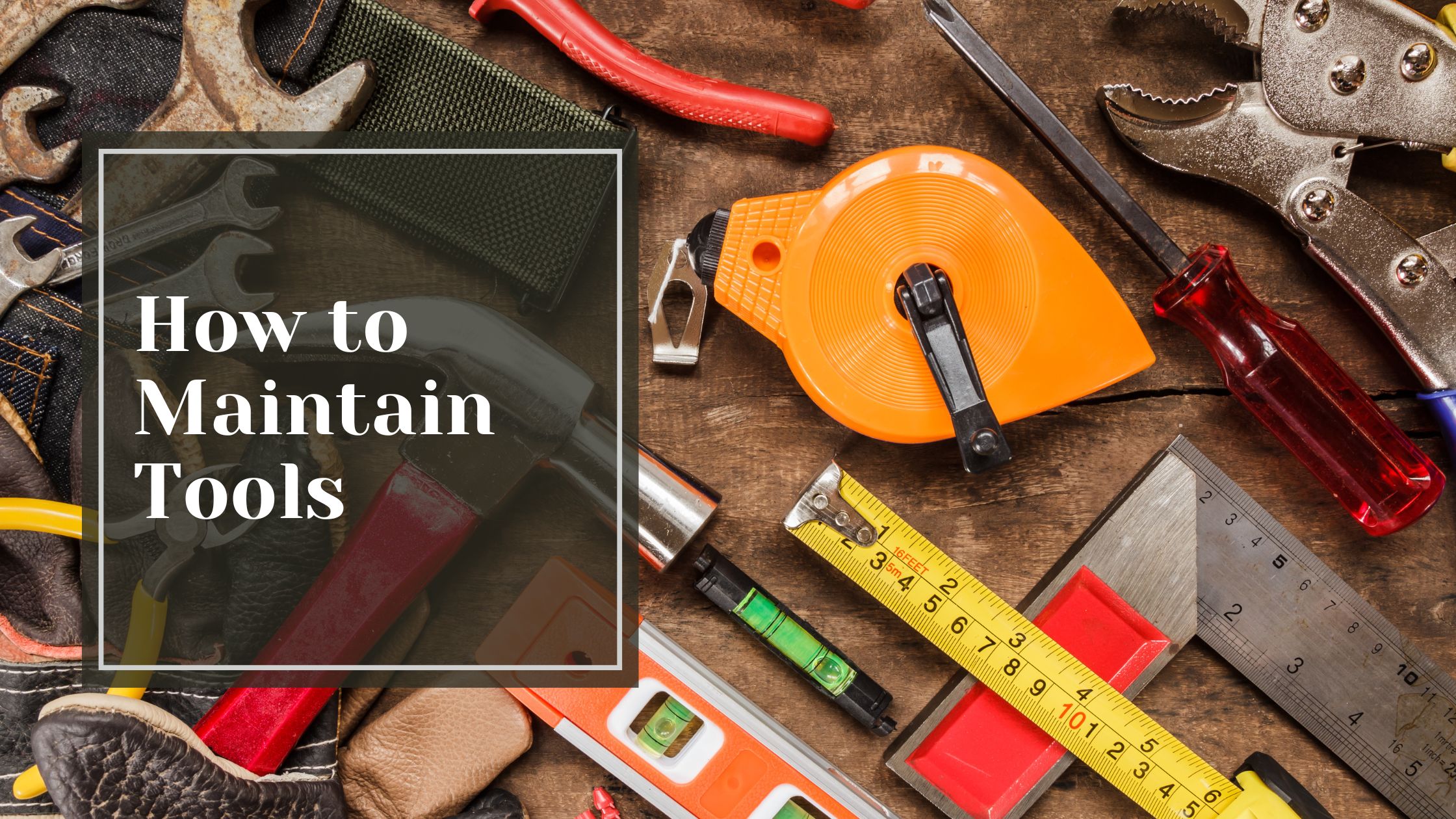Have you ever been watching TV and then suddenly your lights start to flicker like a disco? Nothing is as irritating as flickering lights or worse, scary. Relax before you speed-dial the Ghostbusters. The flickering bulbs are not trying to say that your house is haunted; there should be a message behind it. This guide here at Talking Tradesmen will explore the most common causes of blinking lights, and how they can be made steady again. It could be a do-it-yourself job or time for professionals which we also have covered. Let’s bring forth light on this flashing scenario!
Table of Contents
Toggle
Common Causes of Flickering Lights in Your Home
Have you ever seen your lights blink and wondered what was causing them? Let’s cast some light on this problem regularly occurring in homes. From trivial irritants to possible severe issues, there are several reasons why your lights may be doing the “flicker dance.”
Light Bulbs that are not Fixed Properly
A loose bulb or fixture is one of the easiest causes of flickering lights. When you realize this, first make sure that any bulbs in their sockets are tight enough before going further into worrying about deeper problems. If your light fixture is not fixed properly, it may need to be secured more tightly on the ceiling or against the wall.
Outdated or Faulty Light Switches
Sometimes, the miscreant lies in your hands. The blinking of the lights can be caused by worn-out light switches which create intermittent connections. If you notice flickering every time you touch or move the switch, think about getting a new one instead.
Variability of Voltage
Although your home electrical system is designed to keep a constant voltage, sometimes it may fluctuate slightly. This often happens when large appliances like air conditioners or refrigerators cycle on and off. Some fluctuation is normal, but exaggerated variations could lead to the flickering of your lights.
Circuits Overload
When high-power appliances kick in and there are so many devices plugged into one circuit, it may cause flickering of the lights. This is particularly common in older homes with outdated wiring that was not intended for modern-day electrical demands.
Old-Fashioned or Defective Wiring
Talking about aging houses, one major factor behind blinking lights is old-fashioned or damaged wiring. This is not just irritating—it can also be dangerous. It is important to have a licensed electrician come over if you suspect that your house’s wiring might be the problem.
Remember, while some causes of flickering lights are easy DIY fixes, others require professional attention. When in doubt, it’s always best to consult with a licensed electrician to ensure your home’s electrical system is safe and up to code.
How to Troubleshoot Flickering Lights: Step-by-Step
When you notice your lights starting to flicker; get on your detective hat and get to the root of the issue. Here are a few steps that will guide you through troubleshooting and possible repair for those annoyingly blinking lights.
Check the Bulb First
Before you jump into complicated solutions, start with the simplest one. Loose bulbs often lead to flickering lights. Gently turn the bulb until it settles properly in its socket. If it doesn’t work, go for another one. Sometimes old or faulty bulbs can be responsible for flickers that come on and off.
Inspect the Light Switch
The next phase in our journey of troubleshooting involves checking if the light switch is all right. A loose or defective switch may make lights dim for a moment and then grow brighter again due to an intermittent connection being made. Try flipping the switch on and off several times. If there is any difficulty experienced when doing this or strange sounds are heard emanating from within then consider replacing it by calling an electrician in.
Examine Your Electrical Panel
If the problem persists, it’s time to take a peek at your electrical panel. Look for any tripped circuit breakers or blown fuses. Reset any tripped breakers and replace blown fuses. If you’re not comfortable doing this yourself, don’t hesitate to contact a professional electrician.
Consider Your Appliances
Believe it or not, large appliances can sometimes cause lights to flicker when they turn on. This is especially true for older homes with outdated wiring. Pay attention to when the flickering occurs. If it coincides with your refrigerator or AC unit kicking on, you might need to have an electrician upgrade your electrical system to handle the load.
When to Call a Pro
If you’ve tried these steps and your lights are still doing the flicker dance, it’s time to bring in the big guns. An experienced electrician can diagnose more complex issues like loose wiring connections or problems with your home’s main electrical service. Remember, when it comes to electrical issues, safety should always be your top priority.
Master the fundamentals of electrical systems with 'Delmar's Standard Textbook of Electricity.' Ideal for journeyman electricians, this concise guide covers essential principles for installing, repairing, and troubleshooting electrical components.
When to Call an Electrician for Flickering Lights
While some flickering light issues can be resolved with simple DIY fixes, there are times when it’s crucial to bring in a professional. Let’s explore when you should put down the toolbox and pick up the phone to call an electrician.
Safety First: Recognizing Serious Electrical Issues
If you notice a burning smell, hear buzzing sounds, or see sparks accompanying your flickering lights, it’s time to act fast. These are telltale signs of potentially dangerous electrical problems that require immediate professional attention. Don’t attempt to investigate further on your own – your safety is paramount.
Persistent Flickering Despite DIY Attempts
You’ve tightened bulbs, replaced switches, and even swapped out fixtures, but the flickering persists. This could indicate a more complex issue within your home’s wiring or electrical panel. An electrician has the tools and expertise to diagnose and resolve these hidden problems safely.
Multiple Lights Flickering Simultaneously
When several lights in different rooms flicker at the same time, it’s often a sign of a larger electrical issue. This could be related to your main power supply or circuit breaker panel. These components are best left to the professionals to inspect and repair.
Outdated or Aluminum Wiring
If your home was built before 1970, it might have outdated wiring that’s more prone to issues. Aluminum wiring, used in some homes from the 1960s to 1970s, can be particularly problematic. An electrician can assess your wiring and recommend necessary upgrades to ensure your home’s safety and efficiency.
Remember, electrical work can be dangerous if not done correctly. When in doubt, it’s always better to err on the side of caution and consult a licensed electrician. They can provide peace of mind and ensure your home’s electrical system is safe and up to code.
Frequently Asked Questions About Fixing Flickering Lights
Can Flickering Lights Be Dangerous?
While occasional flickering might seem harmless, it can sometimes indicate serious electrical issues. Persistent flickering could signal loose wiring, overloaded circuits, or even fire hazards. It’s always best to address the problem promptly to ensure your home’s safety.
How Do I Know If It’s Just The Bulb Or A Bigger Issue?
Start by swapping out the flickering bulb with a new one. If the problem persists, it’s likely not the bulb itself. Check if the flickering occurs in multiple rooms or with specific appliances. Widespread flickering often points to a more significant electrical problem that requires professional attention.
Is It Normal For LED Lights To Flicker Slightly?
Some minor flickering in LED lights can be normal, especially when dimmed. However, constant or severe flickering isn’t typical. This could be due to incompatible dimmer switches, poor-quality LEDs, or electrical system issues. If you’ve ruled out compatibility problems, it’s worth calling an electrician to investigate further.
How Often Should I Have My Home’s Electrical System Inspected?
Experts recommend having a professional electrical inspection every 3-5 years for older homes and every 10 years for newer ones. However, if you’re experiencing frequent flickering or other electrical oddities, don’t wait for a scheduled inspection. It’s always better to err on the side of caution when it comes to electrical safety.
Can The Weather Affect My Lights’ Performance?
Absolutely! Severe weather conditions like storms or high winds can cause power fluctuations, leading to flickering lights. If you notice flickering only during bad weather, it might be a grid issue. However, if it persists after the weather clears, there could be damage to your home’s electrical system that needs addressing.








